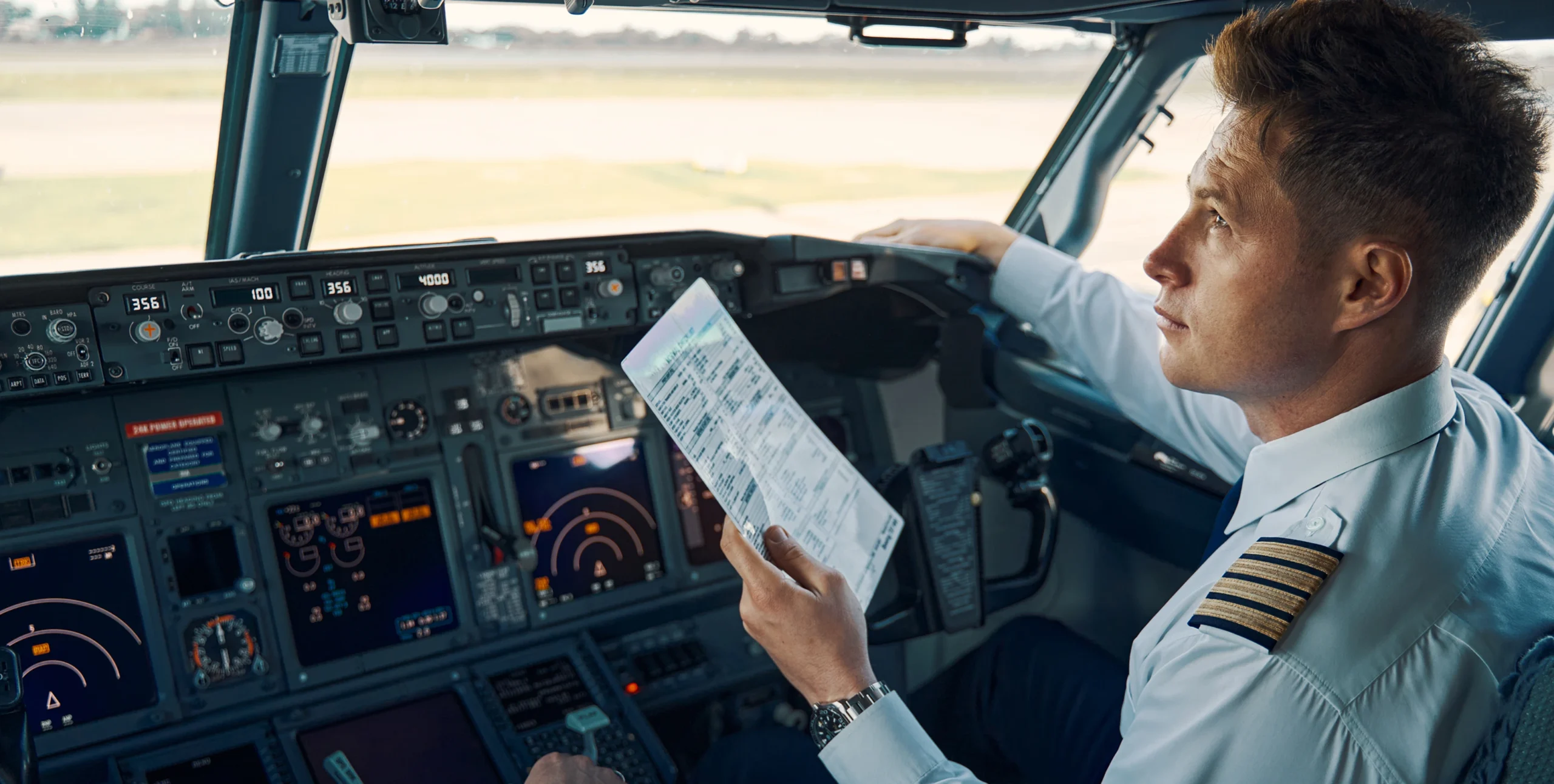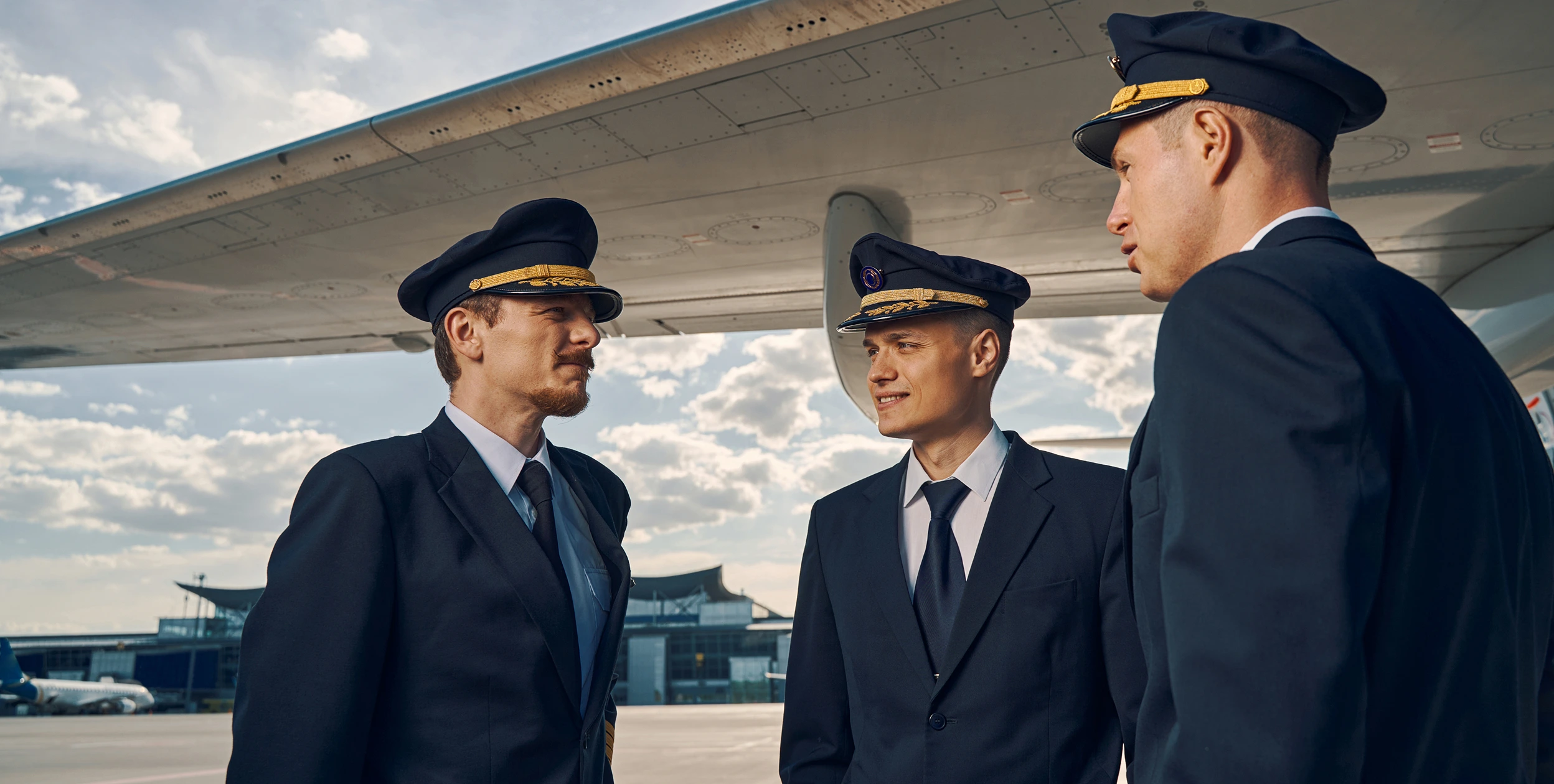Discover how to take off professionally in the aviation industry
Are you just starting your journey in aviation or looking to move up to higher positions? In this guide, you’ll find key strategies, recommended training programs, and practical tools to boost your aviation career from Colombia.
Before taking off in the aviation world, it’s essential to clearly define your professional goals: Do you dream of becoming a commercial pilot or a flight instructor? Setting concrete objectives will help you design a clear roadmap and choose the best training options available in Colombia. At Global Training Aviation (GTA), we help you identify the most suitable program based on your profile and aspirations.
You’ll also need to carefully assess your current licenses (PPL, CPL, ATPL, or specific certifications) and determine the steps required to move forward. In many cases, completing a Type Rating is key to making the next big leap in your career. Having a well-defined goal will help you optimize your time and financial investment, increasing your chances of success in Colombia’s competitive aviation market.
To advance your aviation career, it’s essential to invest in high-quality training and earn certifications that truly make a difference. Key courses such as Type Rating, MCC (Multi-Crew Cooperation), CRM (Crew Resource Management), and UPRT (Upset Prevention and Recovery Training) are highly valued by airlines and prepare you to operate in demanding, real-world environments.
A smart strategy is to get certified on aircraft that are both popular and in high demand in Colombia and worldwide, such as the Airbus A320 or Boeing B737. At GTA, we offer A320 Type Rating programs not only in Indonesia and Spain, but also in Colombia combining state-of-the-art simulators with certified training programs. It’s also crucial to prioritize training centers approved by the UAEAC or recognized internationally to ensure your certification is valid and competitive both nationally and globally.
Proficiency in aviation English is an essential requirement for any pilot or crew member aiming for international opportunities. Preparing to pass the ICAO exam is a crucial step, as it certifies your ability to communicate safely and effectively during flight operations, in compliance with global standards.
Additionally, investing in specialized technical English courses for pilots and crew will help you acquire the vocabulary, expressions, and listening comprehension skills needed for real-life cockpit situations. Speaking fluent English not only opens doors in Colombia but also significantly increases your chances of employment with international airlines, where this skill is highly valued. On your path to a global aviation career, mastering the language is just as important as mastering the simulator.

Building a solid aviation career requires more than just theory: hands-on experience is essential. Training on certified Full Flight Simulators, like those offered by Global Training Aviation in Bogotá, provides full immersion in real operational conditions, preparing you to handle critical situations with confidence and precision.
Additionally, completing supervised practice sessions at recognized training centers, such as GTA or its partner schools, allows you to apply your knowledge in controlled environments and gain valuable experience. It’s crucial that all your flight hours are properly logged and officially recognized by aviation authorities like the UAEAC, as this strengthens your professional profile and facilitates future certification and hiring processes.
In the aviation industry, your network can be just as valuable as your technical experience. Attending aviation fairs, networking events, and industry conferences allows you to connect with recruiters, instructors, and other key professionals, while staying informed about new opportunities and market trends.
It’s also essential to build an active presence on platforms like LinkedIn, where you can showcase your professional profile, share achievements, and connect with airlines, training centers, and fellow pilots. Maintaining relationships with your instructors, alumni, and training institutions can open unexpected doors, as many opportunities arise through a well-managed recommendation or contact.
Cities like Bogotá, Medellín, and Cali have become strategic hubs for aviation training and professional development. These urban centers host Colombia’s top aviation academies, advanced simulation centers and a strong presence of airlines, translating into greater opportunities for hands-on training, employment, and career growth.
Beyond their educational offerings, these cities provide logistical, economic, and connectivity advantages that make it easier to access recurrent training, certifications, and recruitment processes. Studying at schools with direct ties to national and international airlines, such as Global Training Aviation, places you in a strategic position to enter the aviation job market from the heart of Colombia’s aerospace industry.
Your training as a pilot or aviation professional in Colombia can be the first step toward a global career. Did you know you can validate your license to fly in Europe, the United States, or other countries? With the right preparation and by meeting the requirements set by authorities such as EASA or the FAA, many Colombian pilots have successfully made this international leap.
There are agreements between Colombian aviation schools and international training centers that facilitate access to license conversion programs and specialized training. Additionally, preparing for global recruitment processes, such as technical interviews, psychometric tests, or English-language exams, is key to competing successfully. At GTA, we help you acquire the skills and certifications needed to launch your career beyond borders.

With a clear vision, the right training, and a strong professional network, you can soar higher than you ever imagined. Colombia has the talent and you have the potential.
At GTA Colombia, we offer you the opportunity to train on our Airbus A320 Full Flight Simulator and earn an internationally recognized certification. Now is the time to invest in yourself, chart your professional path, and take the first step toward a global aviation career.
The most highly valued training programs include the Type Rating, MCC (Multi-Crew Cooperation), UPRT (Upset Prevention and Recovery Training), CRM (Crew Resource Management), and Full Flight Simulator sessions. Courses like the A320 Type Rating at GTA Colombia offer internationally recognized certification and realistic hands-on experience.
Before enrolling in an A320 Type Rating course, you must hold a valid CPL (Commercial Pilot License) or ATPL (Airline Transport Pilot License). The training must be completed at a UAEAC-approved center, such as Global Training Aviation, which offers a comprehensive program including theoretical instruction, simulator practice, and official certification.
There are specialized aviation English courses for pilots and crew members offered by recognized aviation schools. You should look for programs that specifically prepare you for the ICAO (OACI) exam and provide internationally valid certification. These courses help you develop the technical vocabulary, communication skills, and listening comprehension needed for real-world aviation scenarios.
To fly abroad, you must validate your license with the aviation authority of your destination country, such as EASA in Europe or the FAA in the United States. You’ll also need to master aviation English, meet the minimum required flight hours, and prepare for technical interviews, international medical exams, and skill assessments. These steps are essential to successfully transition into the global aviation market.